6.4. Levels of Policing and Role of Police
Tiffany Morey
Learning Objectives
After reading this section, students will be able to:
- Understand the various options for careers in the policing and law enforcement arena
- Discuss educational requirements are required for law enforcement positions with the federal government, state, county, municipal, or city officer candidates
- Explain what a state police officer’s main objectives are
- Describe the difference between commissioned and civilian
- List several divisions that a commissioned officer can promote to
- List several departments that a civilian can work within a law enforcement-type agency
- Discuss why different police departments work with each other
Critical Thinking Questions
- What education does a candidate need for jobs in federal law enforcement?
- What education does a candidate generally need for city or county jobs as a police officer?
- Is there a difference between a person who is considered commissioned and a person who is considered a civilian?
- Does every law enforcement agency have the same opportunities for advancement?
- Why do different police departments work together?
- Can a person be a homicide detective without being a police officer?
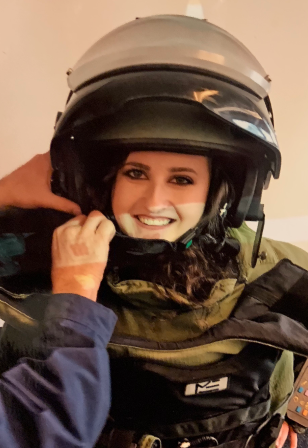
Policing Types
It is an exciting time for those entering the policing or law enforcement field. The choices are endless, and one need not look far to find areas that draw the mind and excitement of the prospects in such a career field. All too often, candidates only think of local police departments; i.e., city or county agencies. The options available are genuinely multi-faceted. Whether one is looking for the stereotypical police officer role, or if it is the study of the criminal mind, possibly criminal forensics, or even crime analysis, or if one loves the forest or the water, the options are endless. While the below list is not all-inclusive, it does give a good detailed look at the array of careers one could have in the policing or law enforcement field.
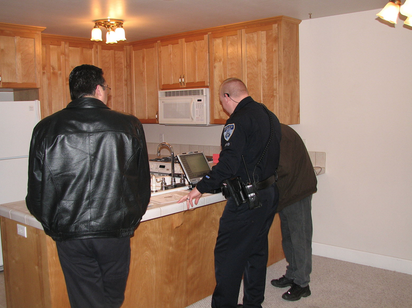
Federal Level: The federal arena of law enforcement careers is broad. The options are almost endless, and the rewards outweigh most of the other local agencies. However, there is a catch, which centers on education and experience. Most law enforcement-related careers in the federal arena require a bachelor’s degree, at a minimum plus three years of related full-time work experience before applying.
Candidates interested in the Federal Bureau of Investigation (FBI) as a special agent, for example, are looking at the following educational requirements:
- A bachelor’s degree in either accounting, computer science/information technology, or foreign language (only a criminal justice major if the candidate is planning on working full-time for a law enforcement agency for at least three years before applying),
- OR a JD degree from an accredited law school,
- OR a diversified bachelor’s degree AND three years of professional experience, OR a master’s degree, or Ph.D. along with two years of professional experience.
Federal job possibilities (the list is not comprehensive)
- Federal Bureau of Investigation (FBI)
- Bureau of Alcohol, Tobacco, Firearms, and Explosives (ATF)
- Drug Enforcement Administration (DEA)
- Secret Service
- Central Intelligence Agency (CIA)
- National Security Agency (NSA)
- United States Marshals Service (USMS)
- U.S. Park Police
- U.S. Fish and Wildlife Service (USFWS)
- Department of Justice
- Federal Bureau of Prisons
- U.S. Army Criminal Investigation Command (CID)
- U.S. Army Counter Intelligence
- Dept. of Agriculture-Office of Inspector General (USDA-OIG)
- U.S. Forest Service Law Enforcement & Investigations (USFS LEI)
- Department of Commerce-Office of Inspector General (DOC-OIG)
- Office of Security (DOC-OS)
- US Commerce Department Police
- Office of Export Enforcement (OEE)
- National Institute of Standards and Technology Police
- United States Pentagon Police
- Department of Defense-Defense Criminal Investigative Service (DCIS)
- United States Pentagon Police (USPPD)
- Department of Defense Police
- Defense Security Police
- Defense Logistic Agency Police
- United States Coast Guard (USCG)
- Plus Many More ++
State Level: State police work for a state. For example, in Oregon, the state police work for the state of Oregon, and the department is Oregon State Police (OSP). In Nevada, the state police are the Nevada Highway Patrol (NHP) and work for the Nevada Department of Public Safety. The commissioned (certified by the state with powers of arrest) employees are generally called troopers (a.k.a. police officers), their uniform is blue (except for California Highway Patrol who wear tan and dark brown uniforms), they wear round-tipped hats, and their primary duty is to patrol the highways and interstates; however, many state police also investigate many different criminal crimes, run criminal forensic labs, along with divisions of fish and wildlife. The duties of each state agency are different and unique to each state. For example, OSP has an explosives unit (see photo below).
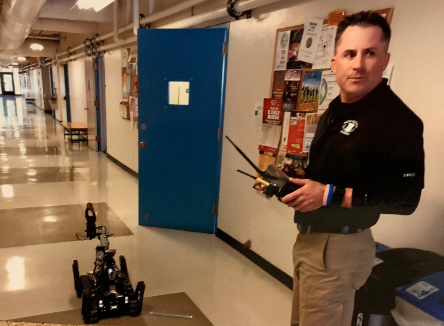
County Level: There are 3,142 counties in the United States. [1] Each county has an elected Sheriff and deputies (a.k.a. police officers) work directly under the Sheriff. Deputies are no different from any other city police officer other than the Sheriff can be responsible for the courts and jails (a.k.a. correctional facilities) in their respective counties. But many city police departments are responsible for jails, so it just depends on the department.
Each state is divided into counties, and each county, depending on size, could have a sheriff’s office. Examples of sheriff offices (county police) in Oregon:
- Jackson County Sheriff’s Office
- Josephine County Sheriff’s Office
- Douglas County Sheriff’s Office
- Deschutes County Sheriff’s Office
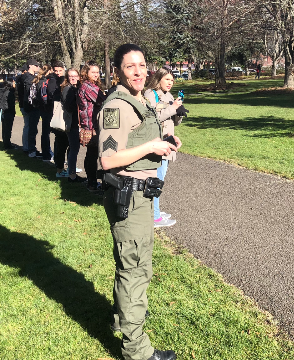
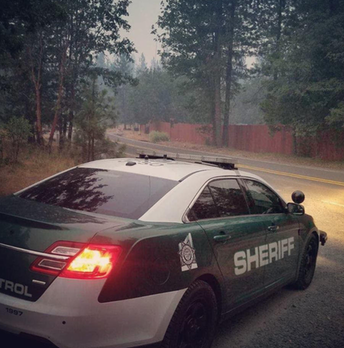
Municipal/City Level: Municipal/City police work under a municipality or city. If a city has a government, i.e., mayor and city council members, and a municipal code (misdemeanor laws for the city), then the city can have city police. If a person works for a city, the designator is a police officer. Some cities have a connected jail (a.k.a. correction or detention facility), while others are operated by the Sheriff and the county.
Most state, county, municipal/city police departments do not require future candidates to have a bachelor’s degree. Currently, many of the candidates testing for such positions do have an associate’s or bachelor’s degree, therefore although it is not required, the candidates are more desirable because they have a college degree. Generally, college degrees become a required educational background, when an officer wants to enter management, i.e., sergeant, lieutenant, or captain. However, many Chiefs and Sheriffs have either a Masters or Ph.D. The following are municipal/city police departments in Oregon:
- Ashland Police Department
- Talent Police Department
- Phoenix Police Department
- Medford Police Department
- Central Point Police Department
- Eagle Point Police Department
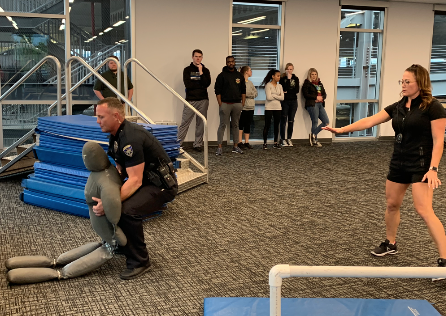
For a complete list of law enforcement agencies (state, county, municipal/city) visit: http://Discoverpolicing.org
Miscellaneous Policing Jobs: Many police jobs may fall under the jurisdiction of the federal government, state, county, or city or they are civilian positions (see below):
- Bailiff for a Court
- Animal Control or Animal Cruelty Investigator
- Computer Forensics
- Correctional Counselor
- Court Clerk or Court Reporter
- Criminologist
- Private Investigator
- Criminal Justice Administration
- Crime Prevention Specialist
- Protection Officer
- Forensic Accountants, Anthropologist, Artists, Hypnotists, Nurses, Pathologists, Psychologists, Scientists, serologists, Toxicologists
- Judge
- Juvenile Probation Officer
- Latent Print Examiner
- Legal Secretary/Paralegal
- Loss Prevention Officer
- Mediator/Negotiator
- Pre-trial Officer
- Security Analyst
- Security Officer
- Social Worker
- Victims Advocate
- Plus Many More ++
Becoming an Officer Example
“I regularly get asked the following question: “Do I have to be a ‘real cop’- you know, a cop that drives in a patrol car and answers calls for service, to be a homicide detective?” I understand this question because a lot of the cop, and detective television shows out there today do not accurately represent this situation. I am so glad the television shows are available because they work as a recruitment tool for many departments. But, I have to disappoint many people, when I give the honest answer…”Yes, you have to be a ‘real cop’ before you can be a detective.” And, I go a step further, in explaining that it can take years, or even decades, to test and promote to a homicide detective.” I explain that many smaller departments that do not have many homicides in a given year have positions open in the detective bureau every two to five years. But, the larger departments that have hundreds to thousands of homicides a year will only promote every ten to twenty years, because even though an officer could be promoted to the detective bureau within several years, the homicide detective is a glamorous position, therefore one must ‘do their time’ as a property detective, investigating vehicle burglaries, etc., before there is a retirement and they have proven themselves enough to take that position.
Divisions within Each Agency: Law enforcement agencies, whether they are federal, county, state, or municipal/city, generally have jobs available within two major areas: 1- Commissioned and 2- Civilian. Commissioned is a term that describes an employee who has been through police training is certified as a police officer and has arresting powers in the state. Civilian is a term that describes an employee who has not been through police training and does not have arresting powers.
One of the fantastic parts of policing is the vast array of jobs available. Whether a person is looking in the commissioned or civilian arena, there are a plethora of choices. Once a candidate has gone through the testing process for a particular law enforcement agency and is hired after a certain number of years ‘on the road’ (the length of time required on the road, is determined by each department) the seasoned officer can then test for many tantalizing individual divisions. Every department is different from those specialized divisions. For example, the Ashland Police Department (APD) in Oregon is smaller and offers its officers a chance to engage in community policing and problem-oriented policing at a one-on-one level, due to its smaller size (thirty-forty officers).
On the other hand, because of its smaller size, the opportunities for advancement are minimal. Officers with the department can also be promoted to management. However, APD does have a few detectives but they do not offer its officers the more glamorous divisions such as those offered by the Portland Police Bureau (PPB). An officer at PPB can be promoted to the following divisions: Drugs and Vice, Narcotics, Asset Forfeiture, Youth Services Division, Traffic, Family Services Division, Detective, K-9, Explosive Disposal, Gang Enforcement, Air Support Unit, Rapid Response, and more.
Policing can be multifaceted thereby keeping its officers engaged. Unlike many other professions, the daily job of a police officer, depending on the respective department, can change with divisions. One year a police officer may be writing a traffic citation from a patrol car, and the next year the same police officer may be driving an off-road motorcycle patrolling the local park or riding a mounted horse in the downtown area.
The choice to have a career in policing is enormous, but the candidate must go one step further and start researching to decide what type of policing, and then dig even further to pick which agency and what possible divisions the candidate would like to have the opportunity to join one day.
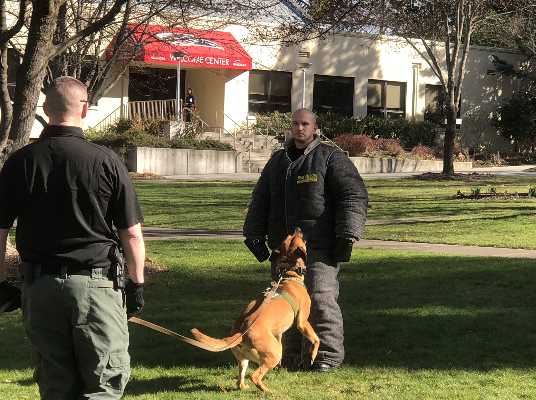
COMMISSIONED- Divisions within a Law Enforcement Agency:
- Detective/Investigations (Persons Crimes- Property Crimes- Homicides, Rape, Robbery, Burglary, Auto Theft, DUII, Domestic Violence)
- Motors
- Narcotics
- Human/Sex Trafficking
- VICE
- Crime Scene Investigation (CSI)
- SWAT
- K-9 (patrol, drug, and search & rescue dogs)
- Crisis Negotiator
- Mounted Unit (horses)
- Air Unit
- Training/Range Master
- Academy/Tac Officer
- Bike Patrol
- Recruiting
- Internal Affairs
- Public Information Officer
- Gangs
- Search & Rescue
- Forest and Fish & Wildlife
- Marine
- Various Area Task Forces (usually made up of various law enforcement agencies in the area- sometimes include federal agencies too)
- Plus Many More ++
CIVILIAN- Divisions within a Law Enforcement Agency:
The civilian areas of each police department are also fascinating. Not every person is meant to go into law enforcement as a police officer. It is a strenuous and stressful job that attracts many but is only made for a few elite. However, don’t fret; there are many options in the law enforcement realm. Putting on a bullet-proof vest, filling a holster with a semi-automatic handgun, and continually training to be in tip-top condition do not appeal to everyone, so there are still many jobs available in the law enforcement arena. Civilians are the other half of the equation and are a much-needed commodity for every law enforcement agency. When a citizen dials 9-1-1, a dispatcher answers the phone, and that dispatcher is a civilian. When a police officer finds heroin on a suspect takes custody of it and later books it into evidence at the police station, the evidence technician is the civilian who logs and follows through with the chain of custody for the heroin evidence. Civilians are just as important as the commissioned positions at a law enforcement agency.
Example civilian positions at law enforcement agencies:
- Dispatch/911 Operator
- Records
- Crime Analysis
- Forensic Unit/CSI
- Training
- Fleet Management
- Support/Facilities
- Human Resources
- Operations Support Unit
- Recruitment Coordinator
- Volunteer Coordinator
- Administrative Support
- Plus Many More ++

Contact with Outside Agencies: It takes a team to accomplish policing. One federal, state, county, or city police agency cannot do it all alone. To succeed the agencies must work together. Whether a narcotics division works with the ATF or an entire SWAT team comprised of officers from various city and county departments, the team concept in policing is unwavering.
Oregon has a lot of examples of coordination between different agencies to make things happen. For example, in Jackson County (Oregon) there is The Medford Area Drug and Gang Enforcement (MADGE) Unit; there was a need in Jackson County, to work towards controlling the gangs and drugs in the valley, and one department could not complete the mission alone. Therefore, MADGE was created to engage the following agencies:
Medford Police, Ashland Police, Central Point Police, Jackson County Sheriff’s Office, Oregon State Police, Jackson County Community Corrections, Federal Bureau of Investigation, Homeland Security Investigations Division, and the Oregon Army National Guard. Not only does the job get done more efficiently and more effectively but also the communication that occurs when nine different agencies converge is awe-inspiring.
Finally, once one enters the policing field, the contacts made daily are numerous.
An officer who works for a city police department can have contact with:
- Jails/Correction/Detention Facilities and Employees
- Prisons
- Prosecutors Office
- Defense Attorneys
- Judges and Lawyers
- Various Social Services
- Educational Entities
These contacts are precious to every police officer and without them; the officer could not complete their job effectively.
- U.S. Department of the Interior (2018, September 23). How many countries are there in the United States? Retrieved from https://www.usgs.gov/faqs/how-many-counties-are-there-united-states. ↵

